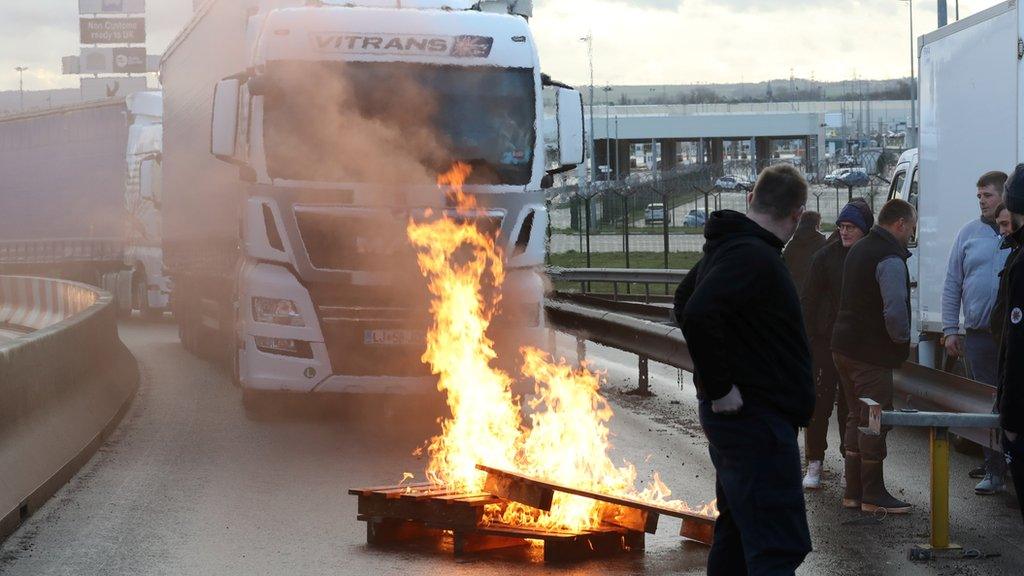Fishing row: Turbulence has hit relations with France, PM says
- Published
Watch: The BBC's Laura Kuenssberg presses the PM over how he plans to remedy the fishing row
Prime Minister Boris Johnson has acknowledged "turbulence" in the UK's relationship with France as the row over fishing rights escalates.
After dozens of French boats were denied post-Brexit fishing licences for UK and Jersey waters, France threatened to block ports to British vessels.
But Mr Johnson told the BBC the things that united the UK and France were more important than their divisions.
The French president said the row was a test of the UK's global credibility.
France has said it will take "targeted measures" against the UK if the row over fishing licences is not resolved by Tuesday.
Brexit Minister David Frost said the government was "actively considering" launching a legal process against France under the Brexit agreement, as a result of the "threats" from France.
Lord Frost described language used by French Prime Minister Jean Castex as "clearly very troubling and very problematic" in the context of ongoing negotiations "trying to solve many highly sensitive issues, including on the Northern Ireland Protocol".
His comments followed the emergence of a letter by Mr Castex, seen by the BBC, which said the EU must demonstrate in this dispute that there was "more damage to leaving the EU than remaining there".
Writing on Twitter, Mr Frost said: "We will continue to talk constructively to try to resolve all the differences between us, and we urge the EU and France to step back from rhetoric and actions that make this more difficult."
Pressed on how the UK would respond to the threats as the G20 group of major economies met, Mr Johnson told the BBC: "We're going to get on and do the things that matter to both of us and make sure that we work together on tackling the big issues that face the world."
Referring to Mr Castex's letter, he acknowledged that "there's some turbulence in the relationship".
"If one of our partners decides to breach the Trade and Cooperation Agreement that we struck, that's a matter that we have to pursue," Mr Johnson said.
The UK government suggested on Friday that France's threatened measures - such as blocking ports to UK boats, increasing checks on UK goods, boats and trucks, and even cutting energy supplies - would be a breach of the post-Brexit trade deal with the EU.
The prime minister also suggested the UK was concerned France may be "already in breach" of the deal.
Mr Johnson raised his concerns with European Commission head Ursula von der Leyen over the "rhetoric from the French government" at a meeting at the G20 summit, the prime minister's office said.
In a statement, a spokesman added: "The prime minister stressed that the French threats are completely unjustified and do not appear to be compatible with the UK-EU Trade and Cooperation Agreement or wider international law."
Mr Macron and Mr Johnson are expected to have an informal meeting on the margins of the G20 summit in Rome on Sunday.
But asked if he felt the French behaviour was unacceptable, Mr Johnson told the BBC the priority for the UK and France was making progress on tackling climate change in talks at the G20 summit and at COP26 in Glasgow.
Speaking from the Colosseum in Rome, he invoked the collapse of the Roman Empire as he said the world was "absolutely conniving in our decline and fall".
"What we want to do is to get the world to focus on the threat that humanity faces," he said.


As a chronicler of Brexit back 'n' forths and brouhahas, I like to think I've seen quite a bit.
But diplomacy via a Twitter thread of a Saturday afternoon still feels like a new one on me.
Lord Frost's threat of legal action contains some pretty punchy language.
But it is a counter threat to an existing threat from France, to make trade between the two countries harder from next week unless this row is resolved.
And so a cranking up of the language, on both sides today, could yet prevent a cranking up of the action either side takes, rather than the opposite.
Should the legal path end up being pursued, we're told both sides would appoint lawyers and it would become a tussle with the European Union rather than with France.
And it could take rather a while.

Jean-Marc Puissesseau, president and chairman of the ports of Calais and Boulogne-sur-Mer, told BBC Radio 4's Today programme that the dispute concerned only about 40 boats, "a drop of water in an ocean".
He said these boats had been unable to prove their history of fishing in British waters, as the UK required, either because they had been unable to take part in a monitoring survey or because the fisherman had replaced their boats with newer models.
He said if sanctions were imposed by France, "it will be terrible for both sides of the Channel, for you, for us, for the ports, for the fishermen in your country, for the fishermen in our country - and that's only for 40 little boats that are not allowed to fish in your country".

What is the fishing row about?

The dispute over fishing rights reignited last month when the UK rejected dozens of applications from French boats to fish in UK territorial waters post-Brexit.
Under the trade deal, the EU and UK have agreed they will give licences to boats if they can show they have fished in each others' waters for years.
But there have been disagreements about how much evidence is needed, leading to anger from France when applications were denied by the UK and Jersey.
In May, French boats protested outside Jersey's port and France threatened to cut off the island's electricity supply over what it said were unfair terms.

Meanwhile, French President Emmanuel Macron accused the UK of backpedalling on its Brexit commitments over the fishing row and over Northern Ireland.
He told the Financial Times, external it raised questions about the UK's reliability with the EU and with all of its partners.
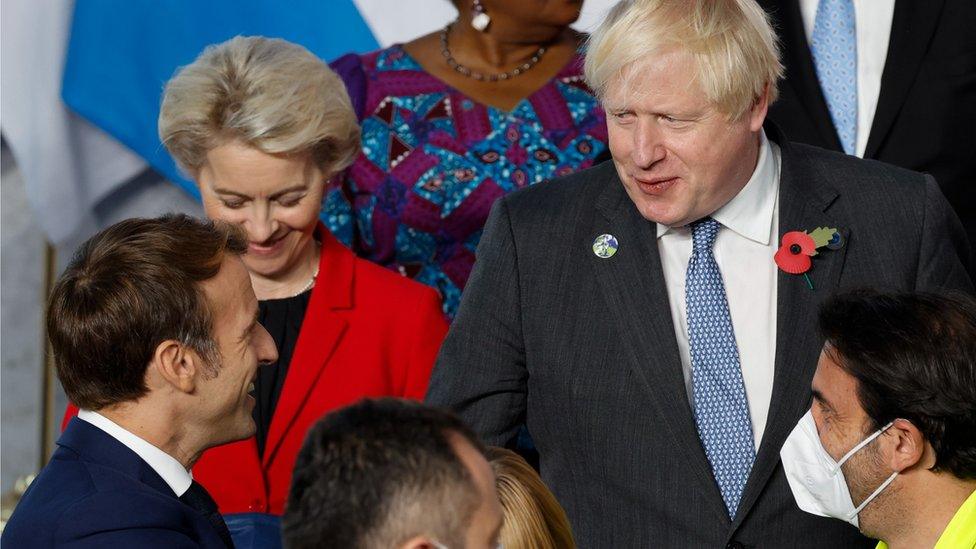
Boris Johnson and Emmanuel Macron greeted each other at the G20 summit in Rome, amid tensions over fishing rights
"Because when you spend years negotiating a treaty and then a few months later you do the opposite of what was decided on the aspects that suit you the least, it is not a big sign of your credibility," he said.
As well as raising the possibility of retaliation, the UK government has said it could launch "dispute settlement proceedings" with the EU if France went ahead with "unjustified" measures.

DON'T FORGET!: Why do we turn the clocks back?
WHY ARE WE SO OBSESSED WITH IT?: The dark days of the European Witch Craze

Related topics
- Published30 October 2021
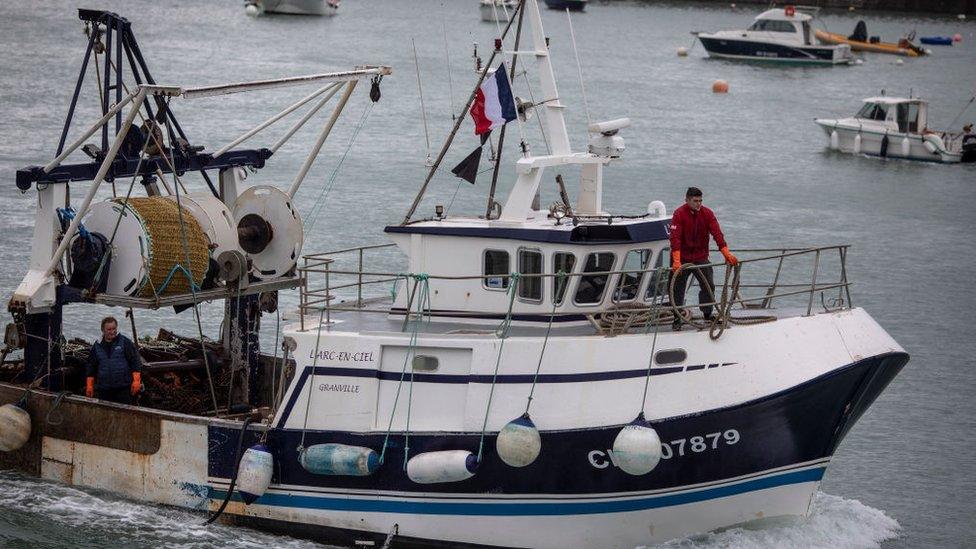
- Published29 October 2021
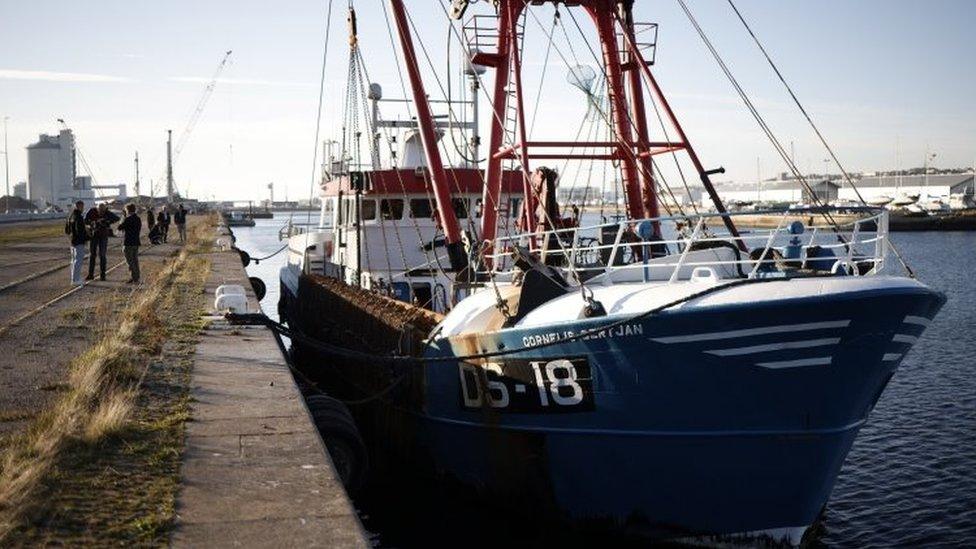
- Published29 October 2021

- Published29 October 2021
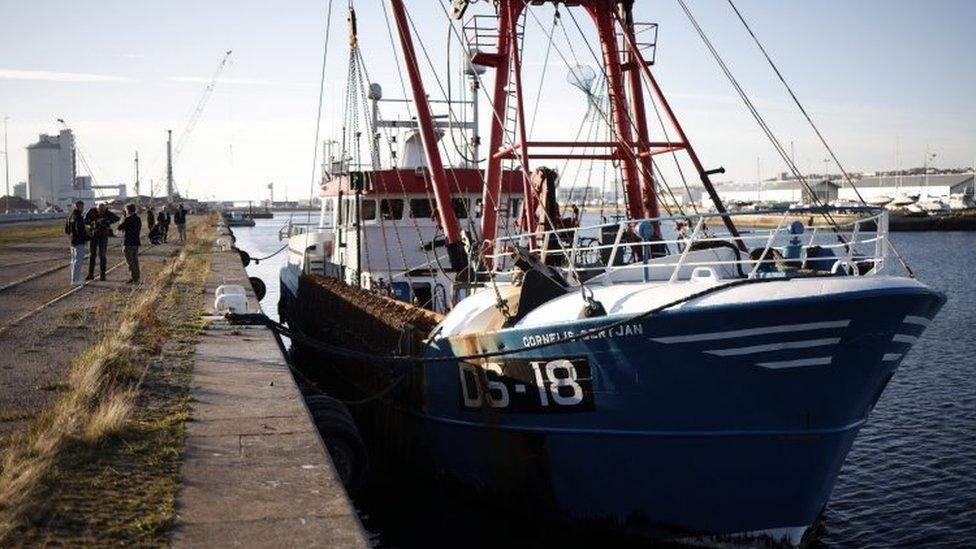
- Published1 January 2021
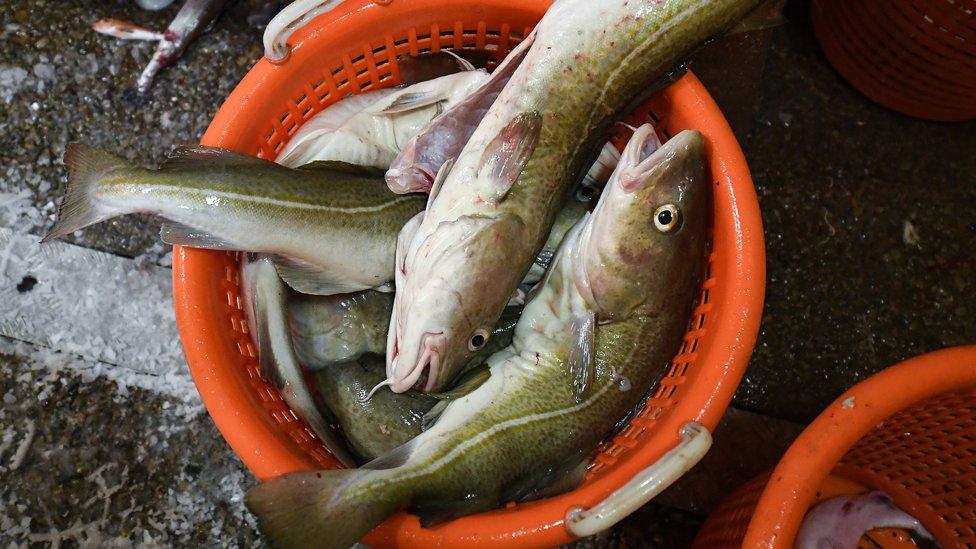
- Published23 December 2021
